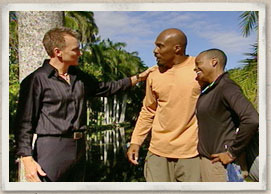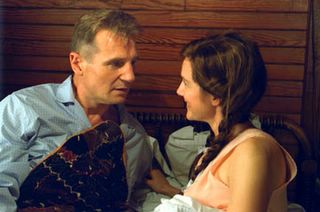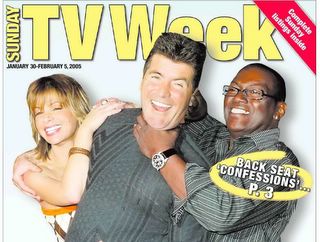New York Times
January 30, 2005
14 Years Later, My Hollywood Ending
By BERNARD WEINRAUB
LOS ANGELES
I CAME to Hollywood in 1991 thinking I knew quite a lot about the world and its ways. As a young reporter, I had been to Vietnam. Later, I covered Northern Ireland, several political campaigns and the White House under President Ronald Reagan and the elder President George Bush. On arriving, I was fresh from a sudden assignment in India after the assassination of former Prime Minister Rajiv Gandhi. But only in my 14 years here - most of it spent covering the movie industry, the rest covering television and music - did I come face to face with some of the more startling, and not always pleasant, truths about human behavior, my own included.
On retiring (officially, this is my final week at The Times), it seems best to sort through this Hollywood tour. It began in a string of modest, even shabby, apartments - one of them, on Martel Avenue in West Hollywood, best remembered for the cluster of police cars, drug dealers and prostitutes on the corner. Along the way I married a studio chief, Amy Pascal, now chairwoman of Sony Pictures. For both of us, the liaison opened a rare two-way window on the inner workings of two worlds, moviedom and the press, that have long been locked in a messy but symbiotic struggle. But our marriage also changed the game. I won't speak for my wife and her own way of coping with career complications born of an alliance with a reporter, but I can say that our wedding, in August 1997, brought to the fore some of my own shortcomings. Clearly, I stayed too long on my beat, clinging to a notion that I could sidestep conflicts of interest by avoiding direct coverage of Sony, and learning too late why wiser heads counsel against even the appearance of conflict. But my marriage, and some of the events that tumbled out of it, also taught me something about the ferocity of a culture in which the players can be best friends one day and savage you the next.
When I finally asked to be taken off the movie beat in 2000, I laughed and said I felt like the Duke of Windsor. But I quickly caught a lesson in how chilly life as a former movie correspondent could be. In the past, I'd written about Jeffrey Katzenberg, then president of the Walt Disney Company. He returned every call quickly and often phoned me; he dished over pasta at Locanda Veneta about all the studios in town and became such a pal that I once showed him off-the-record comments made about him by Michael Eisner. That was wrong and foolish, and years later I still regret it. As soon as I stopped covering movies, Mr. Katzenberg stopped responding to phone calls. I was surprised but shouldn't have been.
Not every Hollywood moment involved operators like Mr. Katzenberg, nor were they all somehow tied up with my marriage. Fellow journalists contributed their share. In one remarkable episode about two years ago, Robert J. Dowling, the publisher and editor in chief of The Hollywood Reporter, threatened to punch me during a charity event. He was upset by an article I had written about two years earlier dealing with staff resignations after his newspaper failed to print an article about an inquiry by the Screen Actors Guild into whether the Reporter columnist George Christy had received pension and health benefits to which he was not entitled. Mr. Christy's column was soon suspended. (Peter Bart, the editor of Variety and a former Times Hollywood correspondent, went beyond Mr. Dowling: he sought to get me removed from the job because of an article I wrote saying that The Hollywood Reporter was catching up with Variety.)
The Hollywood Reporter scandal was, in fairness, pathetic and hardly on the level of Watergate or Iran-contra. And it wasn't akin to the unfortunate way even more serious journalists are co-opted by the overtures of a Michael Ovitz or the charm of a Joe Roth. Mr. Roth, a top Hollywood player, seems available at any time and is willing to schmooze with eager reporters as if he had all the time in the world.
Mr. Ovitz went a step or two further. Shortly after I arrived in Hollywood and met him, when he was at his zenith as chairman of the Creative Artists Agency, he offered to help if my children needed to attend private school or if I needed to find a hospital. I never took him up on the offers.
MY first day here, as I recall it, was in early September 1991. Having just come back from India, I was struck almost immediately by the prevalence of money, and the crazy economic gap between journalists and the people they covered. It was like dropping into Marie Antoinette's France. In Washington, reporters often lived next door to the people they covered. Whatever the income gap between a reporter and a lawyer or lobbyist - and it's considerable - your lives intersected. In the neighborhood. On the subway. At private schools. At parties.
Journalists in Washington do not feel diminished by their lower salaries. In Hollywood, many do. I did. Waiting for a valet at the Bel-Air Hotel to bring my company-leased Ford, I once stood beside a journalist turned producer who said, "I used to drive a car like that." Though I'm ashamed to say it, I was soon hunting for parking spots near Orso or the Peninsula Hotel to avoid the discomfort of having a valet drive up my leased two-year-old Buick in front of some luncheon companion with a Mercedes.
For many of us on the press side, the money gap leads to resentment and envy, compounded by a conviction that studio executives and producers are no better or smarter than the journalists who cover them. Initially, I was simply amazed. My first real Hollywood acquaintance was Dawn Steel, a producer and onetime studio chief, and one of the more dynamic figures in town. (Ms. Steel died of a malignant brain tumor in 1997 at the age of 51). Before leaving New York, I was in the office of Warren Hoge, then the editor of the Times Magazine, who said Ms. Steel would open the gates of the movie world for me. He called her on her car cellphone, which was still uncommon enough that I was dazzled. She insisted that I see her as soon as I arrived. I did so. Her house off Coldwater Canyon, behind gates and atop a winding road, was a sprawling, ranch-style home with panoramic views of the city on a huge plot of land. I had never seen a home like this.
What made it strange was that Ms. Steel was a girl from Long Island - smart, funny, neurotic. She had no airs. She and so many others in Hollywood seemed like people I knew. I grew up with them. And yet they earned bizarre amounts of money that lifted them into a different universe.
My first reaction was to write about that difference. Early on, for instance, I wrote about movie stars and executives trooping into a specially designed soundstage at Sony for the Hollywood Hunger project to benefit Oxfam America. Instead of simply writing checks, the celebrities sought what the caterer, Ruth Hedges, told me was "the actual experience of being poor and hungry."
So the likes of Danny Glover, Jackson Browne, Daryl Hannah, Whoopi Goldberg, Susan Sarandon, David Byrne and Graham Nash drew lots: 15 percent represented high-income countries and dined at fancy tables on stuffed breast of chicken, sun-dried tomatoes and radicchio, and salad with shrimp; 25 percent represented middle-income countries and sat on benches at wooden tables to eat rice and beans and tortillas off paper plates; and the majority, sat on the floor on a mat and had rice and water, as many people in the world do.
Almost as shocking (at least for me) were the gala events to raise money for ecological causes in the early 1990's. At one such event, 700 of the town's elite (Barbra Streisand, Robert Redford, Ted Danson, Jane Fonda) showed up at a soundstage in Mercedeses, BMW's, stretch limos and other gas guzzlers to celebrate Hollywood's commitment to the environment. The invitations said, "In the spirit of the event, we urge you to car-pool." It didn't appear that anyone did.
Detachment from the real, I soon learned, was closely bound up in the culture of stardom, and star behavior, alas, has a way of rubbing off on those of us who come in contact. At first, as I now hate to admit, I was fascinated by the idea of meeting movie stars. (After meeting a few, the fascination ended.) Maureen Dowd in Washington made me promise I'd interview Michelle Pfeiffer soon after arriving. As it turned out, she was my first star interview. She was promoting the film "Frankie and Johnny," in which, bizarrely, she was playing a frumpy waitress.
I met Ms. Pfeiffer at her office in Century City. I was tongue-tied. She talked about her character's loneliness and how she identified with the waitress. I nodded at whatever Ms. Pfeiffer said. She told me it was a fantasy that beautiful people couldn't look unattractive or weren't lonely or hurt. "It doesn't matter what you look like or how old you are," she said. "That's not relevant." Right. For a moment, I believed it.
At another point, at the Toronto Film Festival, I rushed through an interview with Billy Bob Thornton and Bill Paxton about their film "A Simple Plan." It was important for the two actors to promote their offbeat film and get an article in The Times. I cut short the interview and said, "Look, I've got to interview Cameron Diaz." The pair were dumbfounded. She was prettier and a rising star. She was more important. The fact that I had hurt the actors and embarrassed myself still rankles. Not a high point but perhaps the beginning of real understanding about a world that obsessively chases what's young, what's new, what has heat.
My most embarrassing moment in Hollywood was an interview with Jim Carrey that at least absolved me of star fever. The comedian, in a suite at Ma Maison Sofitel, was promoting his film "The Mask." I had taken medicine for a bad cold. The interview began. I was settled into an easy chair, facing Mr. Carrey with my feet crossed in front of me. As he began answering questions, I fell asleep. The next thing I knew, I was feeling somebody kick the bottom of my shoe with his foot. I woke up, mortified. Years later, I met his manager Jimmy Miller. I told Mr. Miller I had a confession: that I fell asleep while interviewing Mr. Carrey. Mr. Miller exclaimed: "So you're the guy! He talks all the time about a reporter who once fell asleep on him."
IN 1996, I met Amy Pascal for a business breakfast at the Peninsula Hotel. She had just been named president of Turner Pictures, a new company founded by Ted Turner.
Not even 18 months later, the company was folded into Time Warner.
As we began dating, I rationalized that I could avoid any hint of a conflict of interest by avoiding any coverage of Turner Pictures. By the time we were married, the next year, my wife had been appointed chairman of Columbia Pictures. I should have left the movie beat right then, if not sooner.
But with the agreement of my editors, who were confident I could deal with the issue, I felt I could continue covering the movie business, avoiding coverage of Columbia and its parent company, Sony, and leaving that to a colleague. It was a delicate balancing act that seemed to work for a while. But I underestimated how closely I would be watched, or how quickly Hollywood would jump on my marriage as way to get an edge in coverage by The New York Times.
Warner Brothers, once a high-flying studio, was at that time beset by a string of expensive movie flops and its parent company's music operation had a weak track record. With a colleague, Geraldine Fabrikant, I covered the failures at Warner, whose co-chairmen were Robert A. Daly and Terry S. Semel. The two eventually resigned.
Mr. Daly was furious and told friends and others that I should not write such articles because of my marriage, a view I came to share, though I remain convinced that the coverage was accurate and fair. Soon enough, an article appeared in Brill's Content, a magazine covering the news media, by Lorne Manly (now a reporter for The Times). It said that "two Hollywood sources" said Warner had offered my wife a production deal instead of "the high-ranking job she sought," and that "instead she headed to Sony." As I read it, the implication was that The Times's articles were written because I was personally peeved at Warner and not because the studio was experiencing failures like "The Postman" and "Sphere."
I wrote to Bill Kovach, the ombudsman for Brill's Content and a former Times Washington bureau chief for whom I had once worked, to complain about what I called the cheap and inept journalism at his magazine, which was itself financed by Barry Diller, George Soros and others. Would the magazine ever write about Mr. Diller or Mr. Soros? I asked in an angry note. Mr. Kovach responded with equal anger. In retrospect, the nastiness of journalists toward The New York Times - and me - should have been a warning that this was a losing battle.
Mr. Ovitz, who began complaining to The Times about my coverage shortly after I arrived, was soon trying to use my marriage as a lever to oust me. He visited The Times after I had written about his troubled management company, which he formed after his dismissal from the Walt Disney Company. At the time Mr. Ovitz was also facing problems because of a failed Broadway investment and a vain effort to start a football franchise.
"What does The New York Times have against me? Mr. Ovitz asked Joseph Lelyveld, then the executive editor, according to New York magazine. "Your football writer hates me, your theater writer hates me and Bernie Weinraub just killed me."
Mr. Lelyveld said: "What are you talking about? If I got all three writers in a room they wouldn't even know each other."
True.
In a later phone conversation, Mr. Ovitz urged The Times to dismiss me and finally shrieked at Mr. Lelyveld: "You don't know anything about our business! I can't talk to you!"
In mid-1999, Mr. Lelyveld came to Los Angeles. I began our lunch by saying that I wanted off the movie beat. Not because I was tired of it, but because it was being used as an excuse to attack me and the newspaper I loved. Mr. Lelyveld was visibly relieved. I had saved him from saying it was getting difficult for the newspaper. I asked about covering television and other entertainment. He agreed.
IN December 2001, less than three years later, I received a call from Julia Phillips, the once-hot producer of films like "Taxi Driver" and "Close Encounters of the Third Kind," who had drifted from center stage in Hollywood long before she wrote her classic tell-all, "You'll Never Eat Lunch in This Town Again." To my regret, I asked her to hold on one minute while I finished on another line. As soon as I returned, Ms. Phillips said: "I'm dying. And I want an obituary in The New York Times."
Shortly after arriving in Hollywood, I had met Ms. Phillips late one chilly afternoon at the Polo Lounge at the Beverly Hills Hotel. I wanted to write about her as the author of a slash-and-burn chronicle that detailed the selfishness, duplicity, nastiness and greed of the Hollywood stars and executives she knew in the 1970's and 1980's. The book also revealed her own plunge into cocaine addiction.
Ms. Phillips said she was a pariah in town. "I saw these people for what they were," she said. In the years that followed I became friendly with her: she would call me periodically to either congratulate me on an article or criticize me, saying I was naïve or had been duped. At dinner at Orso, her favorite restaurant, she was brutally honest about herself and about the Hollywood crowd. "Don't trust these people," she warned me numerous times. "Don't trust anyone here."
I laughed and didn't really believe her. But with time I came to realize that she, more than Dawn Steel, had become my most reliable guide to the ways of what insiders still like to call "the town."
Responding to her call, I immediately drove to see her in her apartment looking out onto West Hollywood and, on a clear day, downtown. I said I wanted to tape-record some interviews for an obituary. And I asked if she wanted anything else. Ms. Phillips said she adored George Clooney and would love to see his latest film, "Ocean's Eleven." (Warner Brothers, which had tapes of the film, sent her a copy the next day.) I spent several days visiting and interviewing her.
Because of her book, Ms. Phillips was an outcast among Hollywood's elite. "At first it bothered me because I really didn't expect that kind of reaction," she said. "I thought people had a sense of humor. I really did.
"Understand, I wasn't a pariah because I was a drug-addicted, alcoholic, rotten person and not a good mother," she said. "I was a pariah because I lit them with a harsh fluorescent light and rendered them as contemptible as they really are."
Ms. Phillips died of cancer in the early days of 2002. I went to her funeral service on the rooftop of her apartment building and thought of what she said while dying. Was it an overstatement? I wonder. I'm part of the Hollywood world now. I can't deny it. I drive a Range Rover. I live in Brentwood. Not everyone is contemptible. Perhaps Julia Phillips was wrong. I hope she is.











